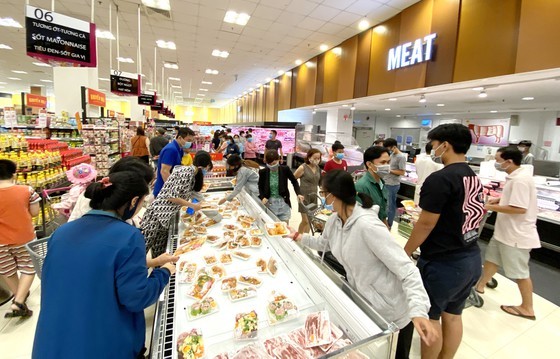
Soon after Vietnam participated in the World Trade Organization, the Southeast Asian country has been ranked as one of the most attractive retail markets. With its population of nearly 100 million people, 70 percent of them at the working age and 34 percent of them in urban areas and the fastest-growing middle class in Southeast Asia, Vietnam has become an ideal market; therefore, giant retail corporations such as Metro Cash & Carry, Casino Group, Parkson, Auchan, 7-Eleven, Aeon, Lotte Mart have flocked to the Southeast Asian country.
Locally, in addition to familiar brand names including Saigon Co.op – investor of Co.opmart, Co.op Food, The Gioi Di Dong, Nguyen Kim, FPT Shop, Hapro Mart, newcomers namely VinGroup with Vinmart, Vinmart+, Bach hoa Xanh ( Green Grocery) jumped into the market.
The presence of local and international retailers has changed the market dramatically. Commercial centers and supermarkets have been booming gradually replacing traditional business.
However, some retailers are exhausted in the intense competition leading to many mergers and acquisitions (M&A) with high value; specifically, Pakson (Malaysia), Metro Cash & Carry (German), Casino Group (France), and Maximark (Vietnam)...
In 2019, Saigon Co.op has bought out French company Auchan Retail’s operations in Việt Nam, which include 15 retail stores and an e-commerce platform. Private conglomerate Vingroup acquired supermarket chain Queenland Mart in last September. Especially, in December, 2019, Masan took over Vingroup retail subsidiary including VinMart, VinMart+ and VinEco.
Along with mergers and acquisitions, many enterprises have operated sporadically with low growth; for instance, 7-Eleven expected to open 100 outlets by 2020 but it has opened just 30 stores in Vietnam and GS25 planned to open 2,500 stores countrywide ten years after January 19, 2018 when it opened first outlet; but in fact, it has opened more than 50 stores so far.
First months of 2020, retailers raced relentlessly to open online business because of social distancing due to Covid-19 crisis.
For sustainable development, retailing systems such as Co.opmart, Big C, Vinmart, Aeon, Emart have spent more on e-commerce. Each supermarket all has hot line so that customers can order commodities through phone.
Statistically, revenue from online sale in first six months has risen by 20 percent -40 percent compared to the same period last year; particularly, turnover of food and foodstuff, cosmetic has skyrocketed by 100 percent.
Distribution stores of state-owned food processor Vissan not only sell goods through phones and portal but also cooperates with e-commerce platform like Sendo and Now to diversify its distribution channels.
Additionally, supermarkets have sold more commodities and combined entertainment areas to satisfy demand of customers of all age. For example, Shopping Mall, Omni-channel have been favorite places for shoppers because they offer customers’ shopping and entertainment demand.
Apart from that, convenience store to provide food and foodstuff, essential commodities also meet consumers’ needs. Take Saigon Co.op as an example. Saigon Co.op is focusing on investment in Co.opmart supermarket chains and retail stores including Co.op Food, Co.op Smile.
The competition in retail industry has been more fierce in the time when consumers tighten their spending due to Covid-19 impacts. To compete each other, retailers will renovate continuously comprising using IT and having business strategies to attract customers.
























